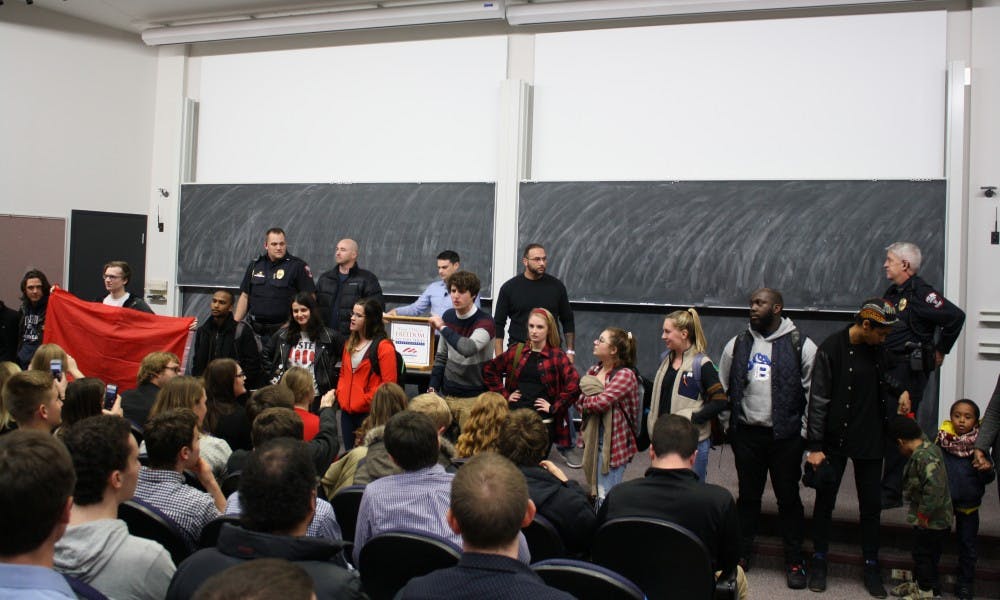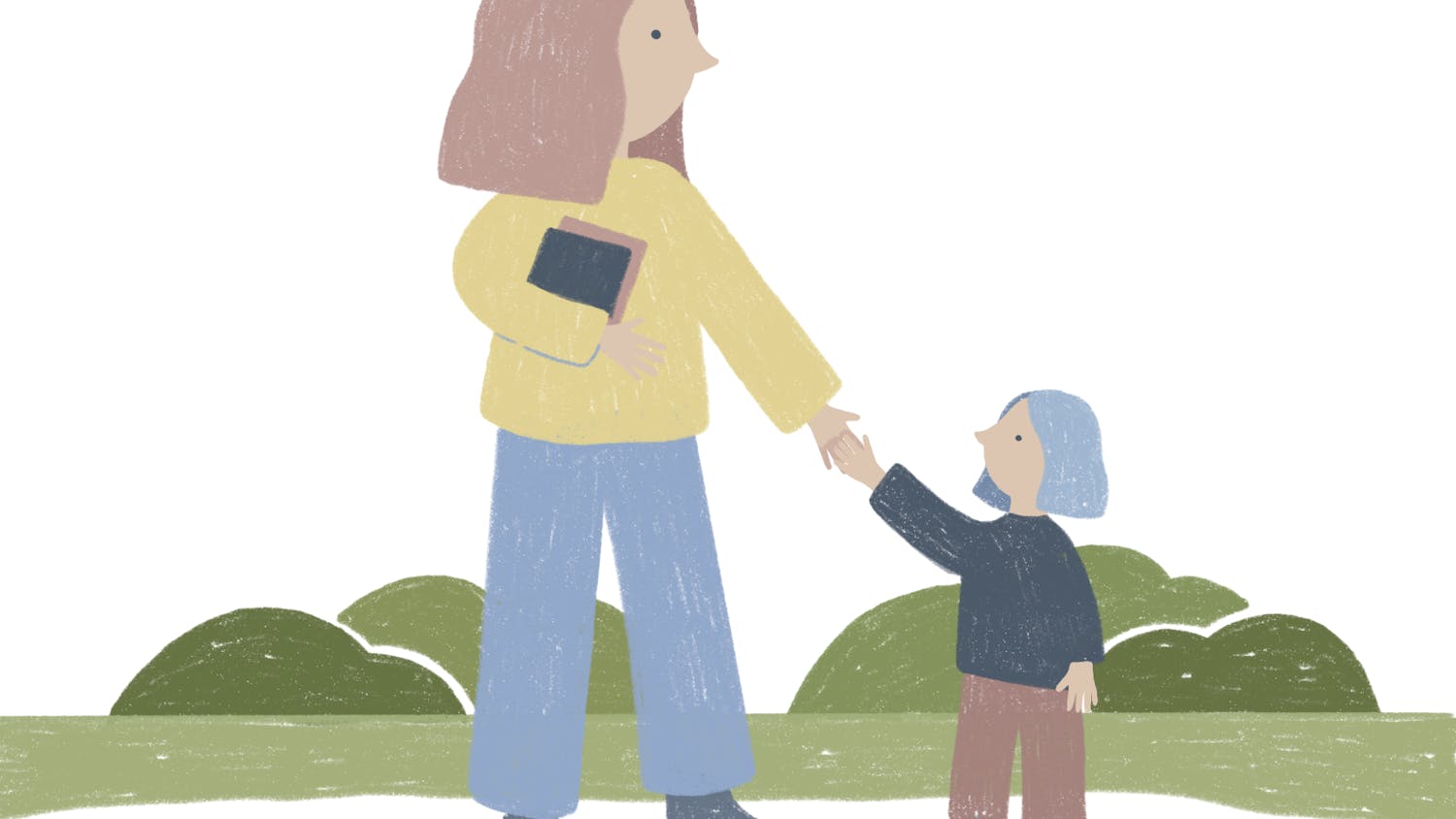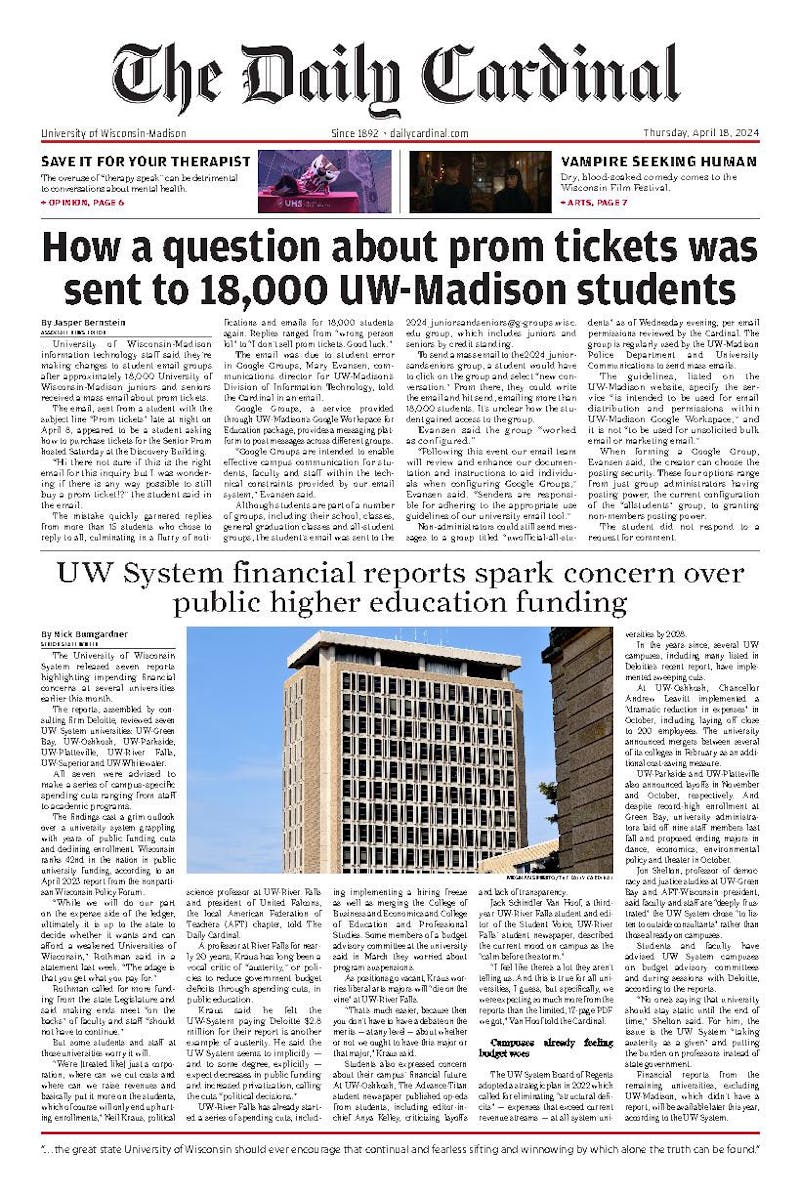Board of Regents take easy way out, enact misguided free speech policy
Thinking of protesting a speaker coming to a UW campus? The Board of Regents wants you to reconsider disrupting such events when, in October, they moved to bar students from interrupting speakers, arguing those protests impinge upon the academic freedom of the presenter. Students who dare attempt such a statement, regardless of political affiliation, could be subjected to a semester suspension. Three incidents would result in expulsion.
The Board of Regents’ decision was an effort to pre-empt a similar bill moving through the state Legislature. But instead of organizing a concerted effort to oppose a measure that is a clear attack on students’ free speech rights, the regents instead opted to roll over and succumb to politicians hoping to co-opt the crusade for greater free speech and instead stifle those who disagree with them.
Speech is not something that should just be protected for liberal students, speakers or groups on our campuses. This bill punishes those looking to exercise their rights to protest and organize, regardless of their political beliefs. The fact of the matter is that the Board of Regents, now overwhelmingly appointed by Gov. Scott Walker, cannot be trusted as caretakers of the rights of students, faculty and staff. We know this because they opted to spinelessly follow lawmakers more interested in outlandish rhetoric and re-election than the members of the UW community, whose First Amendment rights could be trampled by the imposition of this “free speech” measure.
Go Big Read pick sparks criticism

“Hillbilly Elegy,” which tells the story of author J.D. Vance’s early life in Ohio and Appalachian Kentucky, drew immediate disapproval from those who felt Vance painted an unfair picture of folks in the region who grew up in poverty.
Readers also pushed back against Vance’s assertions that this community is often to blame for its own misfortune, arguing that his individual triumph over adversity cannot explain away systematic inequalities that those regions face.
Though Chancellor Rebecca Blank spoke about the book’s ability to “generate a lively conversation,” we must consider its potential effects on students who might not have participated in that conversation and simply took the book at face value.
In an era already rife with isolation of the “other,” what dangerous misconceptions might this book make of Appalachia for UW-Madison students who may not have any other frame of reference for that community?
This university has a responsibility to disrupt prejudiced narratives of those whom any of us could share spaces with someday. The choice of next year’s Go Big Read should be conducted with that responsibility in mind.
UW preserves learning environment, removes TA with racist and anti-Semitic history from teaching duties

In early October, doctoral student C.V. Vitolo-Haddad published a blog post that garnered campus-wide attention. In the piece, Vitolo-Haddad alleged that Dylan Bleier, a graduate student and then-TA for the chemistry department, posted several racist and anti-Semitic statements and photos on Twitter and other social media platforms.
As news of Bleier’s views spread across campus, the university was forced into action. In what UW-Madison spokesperson Meredith McGlone described as a “mutual desire to avoid disruption” in course sections taught by Bleier, the chemistry TA was removed from teaching duties.
In doing so, the university made a clear statement: People are entitled to their opinions outside of the classroom, but one’s views cannot negatively affect the learning environment.
While Bleier was not expelled from UW-Madison or asked to leave, the motion to remove him from the classroom helped preserve a welcoming learning environment. The university smartly recognized that his continued presence in the classroom would cause more harm than good. And while merely removing Bleier from his teaching duties might seem like a passive action and not nearly enough for an accused bigot, it is at least a step in the right direction.
University enacts Badger Promise, a program that offers first-generation students a period of free tuition

At the start of this semester UW-Madison began Badger Promise, a program that provides up to four semesters of free tuition for first-generation students that have transferred to UW-Madison from any of the two-year UW colleges. The program was created in an attempt to make UW-Madison more accessible to Wisconsin students, especially rural and low-income students.
This program is a step in the right direction for the university to better support its first-generation students. As of 2016, there are 5,333 undergraduate first-generation students on campus, about 18 percent of the total undergraduate population. Right now, the only resource specifically dedicated for first-generation students is the Center for Educational Opportunity, which is only funded to serve 435 students.
However, many people are critical of the program and its limits. Right now, the program is quite limited, with strict requirements of recipients being Wisconsin residents who have finished attending a two-year UW school, which could potentially discourage first-generation students from applying to UW-Madison right away. The program also does not cover additional costs of living, such as room and board and textbooks, which can still place a significant financial strain on many first-generation students.
While the creation of this program shows the university’s commitment to better serving all students, there is still room for improvement, and Badger Promise should be expanded and offered to more first-generation individuals.
Campus climate survey shows campus community has lots of work to do regarding the treatment of underrepresented students

When campus officials released the results of UW-Madison’s first ever campus climate survey, the results confirmed what many already knew: Members of underrepresented groups on campus have a much more negative perception of the university than the overall student population. According to the survey results, 81 percent of the overall student population feels welcome on campus. In comparison, only 69 percent of LGBQ+ students, 67 percent of disabled students, 65 percent of black or African-American students and 50 percent of transgender or non-binary students feel the same way.
No one should ever feel unsafe or unwelcome in a place where they come to learn and excel. As a campus, we should have zero tolerance for acts of hostility, discrimination or hate toward each other. However, knowledge and data are powerful tools in helping to lessen — and potentially erase — this problem on campus.
While the data from the survey is not exactly promising, it helps to open the door for improvement on campus. In light of the survey, resources and attention should be properly allocated to the people who need them most in order to improve their experience on campus.\
State Legislature oversteps its bounds

In April, Assembly Bill 206 was introduced by state Rep. Andre Jacque, R-De Pere. Over the last several months, it has progressed slowly, eventually finding its way to the floor of the state Assembly. Hopefully, this is where it will stay.
The bill is a prime example of the state Legislature overstepping its bounds and trying to have too large a role in the university. If the bill were to pass, it would prevent UW System and UW Hospital employees “from, while in the scope of [their] employment, performing or assisting in the performance of an abortion.”
Additionally, the bill would bar UW medical students from receiving training on how to perform an abortion, a ban that would cause UW-Madison’s medical school to lose its accreditation. If a school is not accredited, its students will not become properly certified. As a result, students will likely no longer want to attend UW-Madison, as they would not receive credit for their training.
This bill is an attack on students and their studies. And more concerningly, it is a blatant attack on women’s health.
If Jacque and his fellow lawmakers who support this really cared about UW-Madison students, as well as the health and wellbeing of their constituents, this bill will die without becoming law.
University must acknowledge full, nuanced history of campus land, Lincoln

The passage of the Morrill Land Grants Act, signed into law by then-president Abraham Lincoln, was highly influential in the development of UW-Madison, which is built on Native land. That same president signed off on the execution of 38 Dakota men in 1862 in addition to commuting hundreds of other death sentences.
Indigenous student organization Wunk Sheek and the Associated Students of Madison have asked the university to acknowledge the Dakota hangings on Lincoln’s statue atop campus, a request the university has failed to meet. In this refusal, UW-Madison is letting down its student body — and particularly indigenous students — by not listening to its voices.
Chancellor Rebecca Blank has publicly acknowledged that the university displaced natives, and in an August statement said it is working to produce signage recognizing this history. A fire pit outside Dejope residence hall commemorates the 11 Native tribes of the state. Acknowledging the history of Native people in Wisconsin and Madison is necessary, and the university needs to do so in addition to supporting indigenous students’ requests.
Menstrual products are a basic human right, period

Following the path of other Big Ten Schools, UW-Madison’s student government and administrators conducted a pilot program last April to provide menstrual products in bathrooms around campus, free of charge.
The program was officially enacted earlier this semester, resulting in dispensers in Helen C. White and Sterling Hall, as well as many restrooms in the Red Gym. The decision prompted consideration across the UW System, with UW-La Crosse making an effort toward a similar initiative, and UW-Eau Claire and UW-Milwaukee expressing interest in a similar program.
Those who experience menstruation can tell you, it’s often an expensive and inconvenient experience that can be a hindrance to simple, daily activities. It’s one that often puts those who menstruate at a disadvantage to those who don’t. At best, menstruation is a frustrating interruption and, at worst, it’s debilitating to those without the means to attain menstrual products.
Given that menstruation is not a choice for roughly half of the population, menstrual products should be free and readily available everywhere. We commend those at UW involved in recognizing that freely given access to menstrual products should be a basic right, and following through to ensure that for the those on UW-Madison campus, it is.
Cardinal View editorials represent The Daily Cardinal's organizational opinion. Each editorial is crafted independent of news coverage. Please send all comments,






